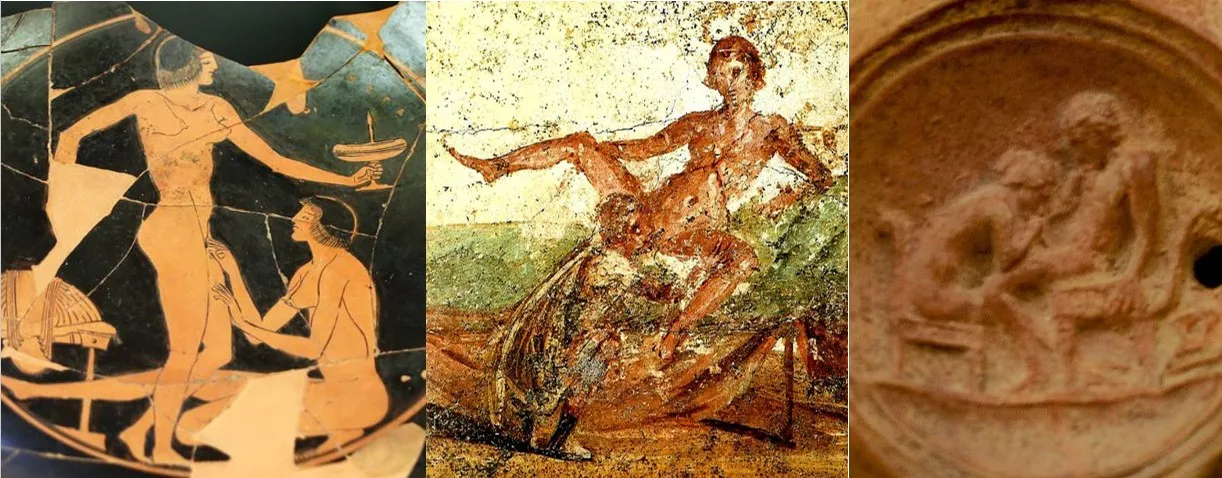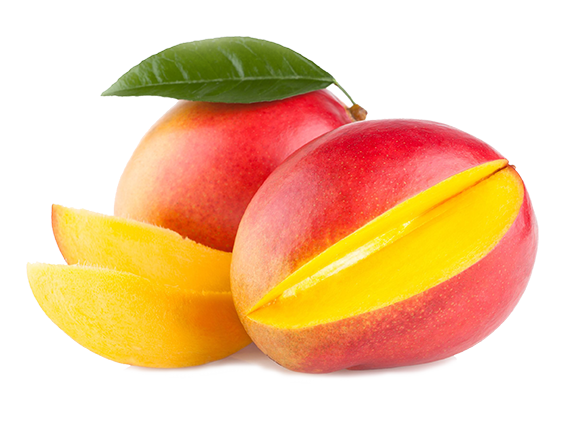10 Facts About The History of Oral Sex
- Elexus Jionde

- Apr 24, 2025
- 8 min read
What is the history of oral sex? Has oral sex always been accepted? When was oral sex taboo? What does oral sex have to do with witches? Lets dive in with 10 facts about Oral Sex. Think you'll know them all?

Even in Ancient History, men hated giving head.
Greek pottery provides depictions of both fellatio and cunnilingus, but during Hellenistic Greece, to eat pussy was seen as emasculating, and there are insults that center cunnilingus. Mind you, the Greeks are the same ones who were obsessed with art involving penises and okayed Pederasty, or relationships between old men and teen boys. The greek playwright Aristophanes called eating pussy an “abominable pleasure,” only using it to illustrate a character as a moral failure. Aversion to cunnilingus fit into larger cultural beliefs about the mouth, which needed to be kept pure and clean to praise God in Jewish culture and, in the Classical view, the mouth being a man’s most powerful function in a political society. To Romans, pleasing the clitoris was obscene, and the word for clitoris was only used in street graffiti and advertised in brothels. As detailed by Kate Lister in a Curious History of Sex, “when cunnilingus is spoken about in classical literature it is generally regarded as something repugnant, indulged in only by lesbians and weak men whose erection had failed them.”
The rise of Christianity only furthered head aversion.
The medieval church would group oral sex in with all taboo practices under the category of sodomy, underscoring an ongoing tradition to presume oral sex was strictly a homosexual activity. English penitentials demanded a lifelong penance for oral sex, which one remarked, “Those who put semen in the mouth commit the worst evil.” Meanwhile, the same guidelines only required 7-year penance for premeditated murder. Comparing oral sex to cannibalism, murder, and blasphemy became more common as the church systematically began trying to get rid of pagan cults and fringe Christian sects who didn’t outlaw oral sex. The borborites, a christian gnostic sect, were accused of ingesting semen and menstrual blood. They were also accused of eating fetuses. Because all of the sources about this group come from enemies and they were considered dirty, its possible that this isn’t true at all. But the accusations reveal the taboo of genital secretions.
Medieval incels Heinrich Kramer and Jacob Sprenger believed witches drained men of their semen to prevent them from having sex and procreating.

Some legends, like in the 15th century Malleus Maleficarum, the evil misogynist book by medieval incels Heinrich Kramer and Jacob Sprenger about the alleged habits of witches, claimed men were forced to give the unclean succubi cunnilingus. The book, which went through 28 editions between 186 and 1600, also devoted a chapter to allegations that witches drained men of their vital semen and cast sex spells to “magically injure the power of generation- that is, so that a man cannot have sex.” It claimed that the demonic succubi, after draining the semen from men, then transferred the semen to the incubi, who impregnated a female witch. This, some medieval legends claimed, was how children with leprosy were born. This folklore shows how oral sex was viewed as demonic, draining, and ultimately dangerous. The Malleus Maleficarum, or Witches Hammer, added to the intellectual foundation of witch hatred and misogyny, and was the bestselling book behind the Bible for much of the middle ages.
In 2nd Century Northern India, 'sucking the mango fruit' was used to describe fellatio and cunnilingus.
The Kama Sutra, or the art of loving, was created in Northern India most likely in the 2nd century, and included descriptions of oral congress, including fellatio performed on a man by a eunuch. It said, “When … he forcibly kisses and sucks it, this is called sucking the mango fruit.” It mentioned it could be done “on the middle part of women.” It gave the following instructions:
With delicate fingertips,
pinch the arched lips of her house of love
very very slowly together,
and kiss them as though you kissed her lower lip:
this is "The Quivering Kiss”
Now spread, indeed cleave asunder,
that archway with your nose and let your tongue
gently probe her "yoni" (vagina),
with your nose, lips and chin slowly circling:
it becomes “The Circling Tongue”
In Ancient China stances on Oral sex were very dependent on what religious group you subscribed to.
Further to the East in Ancient China, popularity and acceptance of oral sex depended on the ongoing power struggle between Taoism, Buddhism, and Confucianism. While Taoism was permissive, Confucianism adopted the stance that sex was strictly for procreation, and had similar views to westerners. Buddhist tolerance of oral sex can be summed up by a 1997 quote by the then Dalai Lama: “Even with your own wife, using one’s mouth or the other hole is sexual misconduct.” Taoists believed that vaginal secretions were imbued with yin, strengthening properties for men that would balance out their own yang. Chinese literature from Tao periods of power are dotted with oral sex references. Mentions DePierre, “popular stories refer to women servicing ‘jade stalks’, ‘red stalk’, ‘swollen mushrooms” and ‘heavenly dragon pillars,” while men knelt before “peony blossoms’ and the ‘cinnabar gates.’” Fellatio also seemed important to older women in some texts, one recommending that “when she reaches the age of 49, in order to prevent old age from permanently settling in, she needs frequent stimulation of her Jade Gate secretions, increased production of saliva, and frequent absorptions of yang essences.” A 12th century Taoist master claimed that “blowing the flute” would allow for energy exchanges between man and woman. In one early Han Dynasty text written on silk, it was recommended that a woman “give breath to the penis, give food and drink to the penis. Feed it as if nourishing a child.”
Some of your favorite work by Shakespeare has oral sex humor.
During the protestant reformation, which began on October 31st, 1517, catholic views on sex would be reshaped, just as more European literature explored erotica and the habits of sex workers. Oral sex between two men, two women, or otherwise was not included in Britain’s Buggery Act of 1533, which specifically outlawed anal sex. At the end of the century, William Shakesphere included numerous cheeky lines about sex, including oral. Wrote the Bard in the poem Venus and Adonis, “Graze on my lips, and if those hills be dry, stay lower where the pleasant fountains lie.” And in A Midsummer’s Night Dream, “My cherry lips have often kissed thy stones. Thy stones with lime and hair knit up in thee.”
Frenching may now commonly refer to a kiss but it originally was a euphism for oral sex.
The enlightenment period of the late 17th and 18th centuries and the Victorian era of the 19th century only made oral sex, both in practice and art and literature, more widespread. Particularly in France, which wore it’s Freak badge with pride. In erotic literature of the era, the mysterious and allegedly chaste lifestyles of monks and nuns were often literary inspiration. Wrote a French erotic novelist in 1743, “One Sister placed herself astride my throat in such a way that my chin was hidden in her pubic hair, another one put herself on my belly… everything was wet, I floated while fucking.” “Frenching” became a euphemism for oral sex in some areas of Europe. Napoleon Bonaparte wrote about eating out his wife Josephine, who had horrible teeth and regularly cheated on him. But, madly in love with her he wrote, “you know I never forget the little visits, you know, the little black forest… I kiss it a thousand times and wait impatiently for the moment I will be in it.”
For most of American history, oral sex was seen as an act of sodomy committed by sex workers and homosexuals.

12 of the 13 American colonies had laws against oral sex, except for Georgia, until 1817. Before the American Revolution, three separate women were charged with performing cunnilingus, all in Massachusetts. One was fined and whipped. The other two were made to publicly apologize. When the colonies became states, they continued to bring oral sex under the illegal umbrella of sodomy, as early as 1879, in Pennsylvania, and as late as 1938. Of course, this didn’t stop oral sex, and Geoffrey R Stone pointed out in Sex and The Constitution that private sexual offenses were almost never punished in New York, New Jersey, and Pennsylvania. There were also no obscenity laws against “sexual materials not having an anti religious aspect”, meaning porn and erotica was distributed and collected during the colonial era.
The head agenda would spread its wings through the 18th and 19th centuries due to the rise of erotic pulp fiction.
Though oral sex did not become routine in American porn until the 1960s, there was a bunch of oral sex in French porn in the first half of the century. By the 1920s, gynecologists in Europe were beginning to see cunnilingus in a new way. One Dutch gynecologist suggested the mind-blowing possibility that a “genital kiss” could be used as a means of vaginal lubrication and ending frigidity for “inexperienced women” in his book, The Ideal Marriage: Its Physiology and Technique. Though it was banned by the Vatican in 1931, it sold over 500,000 copies worldwide. The guide also recommended fellatio, which at the time if one was good at, made them an “icing expert”. Speaking of slang, there were some really wild terms for eating pussy, or “sipping from the furry cup”, despite the taboo. The late 19th century called it “eating seafood”, keeping with the long held tradition of comparing vaginas to fish, like how it was referred to as fish market, oyster, and fish pie in old Britain. The term “pussy” was also being used in a cheeky way, like by a late-19th-century vaudeville act called “Do You Want To See My Pussy,” in which the performers would lift their skirts to reveal live kittens. “Eating pussy would emerge in the next century, the same period that gave us “Deep Sea Diving, clam diving, and sneezing in the cabbage.” Cabbage is a very old term for vagina, and was also used in blues singer Maggie Jones’s song about cunnilingus, Anybody Here Want To Try My Cabbage? Meanwhile, if someone ventured into the even more taboo analingus, it was called “eating poundcake”.
In modern sexual relations, head is now almost expected.
DJ Khaled, who is a muslim Palestinian (and says nigga but somehow he gets away with it) generated headlines in 2018 when said he gets head but does not give it, elaborating that: “a woman should praise the man — the king.” His belief that returning the favor to his wife would make him subservient mirrors that of the Romans thousands of years ago, and other machismo obsessed men throughout the centuries. Khaled’s admission prompted Dwayne The Rock Johnson to say, “as a man, I take great pride in mastering ALL performances.” The Rock received praise and Khaled largely received criticism, showing how much the perception of cunnilingus had changed. In modern “pussy rap,” artists like Nicki Minaj, Megan Thee Stallion, Cardi B, City Girls, Doja Cat, Ken The Man, and others place emphasis on the importance of being pleased with cunnilingus— a direct and impressive rebuke to centuries of attitudes that have compared pussy to fish, or something that pollutes the mouth. In pussy rap, black women, traditionally denied sexual pleasure or autonomy AND respect, the worship of the female genitals with oral sex is as historically noteworthy as the oral sex musings of Aristophanes or William Shakesphere.
Want more Oral Sex history? Binge the entire series on Youtube!
























































Comments